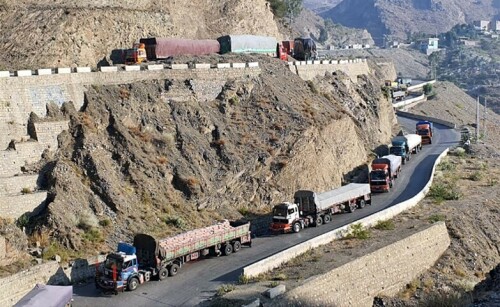PESHAWAR: The Peshawar High Court on Tuesday stopped the National Accountability Bureau from arresting the directors of a Bus Rapid Transit contractor during the ongoing investigation into the alleged irregularities in Peshawar’s bus service project.
A bench consisting of Justice Wiqar Ahmad Khan and Justice Faheem Wali issued notice to the NAB seeking its response to a petition filed by the private contractor, Ch. A. Latif and Sons Limited (Calsons), through directors Chaudhry Imran Latif and Amir Latif.
It fixed Sept 25 for next hearing into the case asking respondents, including the NAB chairman, to continue with the BRT investigation without taking any “adverse action” against Calsons directors, who feared arrest by the anti-graft watchdog.
The petitioners requested the court to declare that the NAB has no authority or mandate to look into the BRT project and harass them.
Seeks bureau’s response to plea against mass transit probe
They also insisted that the NAB proceedings against them, including an inquiry whose report was finalised on March 13, 2023, as well as the subsequent call-up notices, should be declared illegal.
The petitioners contended that the disputes, if any, arising out of the BRT contracts were required to be adjudicated by and decided through a three-tier redressal mechanism, including a dispute board, as per the contract agreements and the NAB got no right to influence and cause impediment in the process of that mechanism.
The NAB had started an inquiry last year that was completed in March 2023 following which it was converted into investigation.
Senior lawyer Shumail Ahmad Butt appeared for the petitioners and said the petitioners company Calsons was a minority partner in the joint venture contractors awarded the contract of the three reaches of the BRT project.
He said besides the three reaches, the petitioners’ firm along with a Chinese firm Anhui was also awarded the building contract of Chamkani Bus Depot, wherein the share of the firm was 30 per cent.
He contended that in the contracts between the parties there had been provided a comprehensive three tier dispute resolution mechanism which had been prepared and penned down by the Asian Development Bank through internationally recognised legal experts.
Mr Butt said two petitions were earlier filed with the high court alleging that the Peshawar Sustainable Bus Transport Corridor Project commonly called as BRT project was not only carried out without lawful authority but also against the public interest.
He, however, said a bench headed by the then PHC chief justice, Yahya Afridi, had declared on Dec 7, 2017 that the project was in accordance with law.
The counsel pointed out that on July 17, 2018, another bench of the high court ordered NAB to conduct an inquiry and investigation regarding transparency of the project and to submit its report.
He, however, said the Supreme Court set aside that high court judgement on Feb 2, 2021.
Mr Butt referred to amendments made in the National Accountability Ordinance, 1999, through the National Accountability Bureau (2nd Amendment) Act, 2022, saying the powers of the bureau were reduced through it and it had no authority to look into procedural lapses in the performance of any public or governmental work or function, projects or schemes unless any monetary benefits by a person was involved.
He contended that despite the judgement of the apex court, the NAB once again started its inquiry and in the “so-called” inquiry it tried to comment on salient features of the project like PC-I preparation and cost, award of civil work contract and selection of consultants by the ADB on behalf of the provincial government.
The lawyer said the NAB had issued call-up notices to the petitioners asking them to appear before them for an investigation process in the instant matter.
He argued that the BRT project had won three consecutive awards for most successful transport project across the world, which was a proof of its quality.
Mr Butt said even the “so-called” inquiry report compiled by the NAB clearly indicated that there was no element of corruption and corrupt practices, and the case was being built on false assumptions, by raising such issues which squarely fell under the ambient of dispute resolution mechanism, inbuilt in the contract.
He contended that in view of the amendments made in the NAB law, the matter was outside the scope and purview of NAB on multiple counts.
Published in Dawn, July 26th, 2023













































Dear visitor, the comments section is undergoing an overhaul and will return soon.